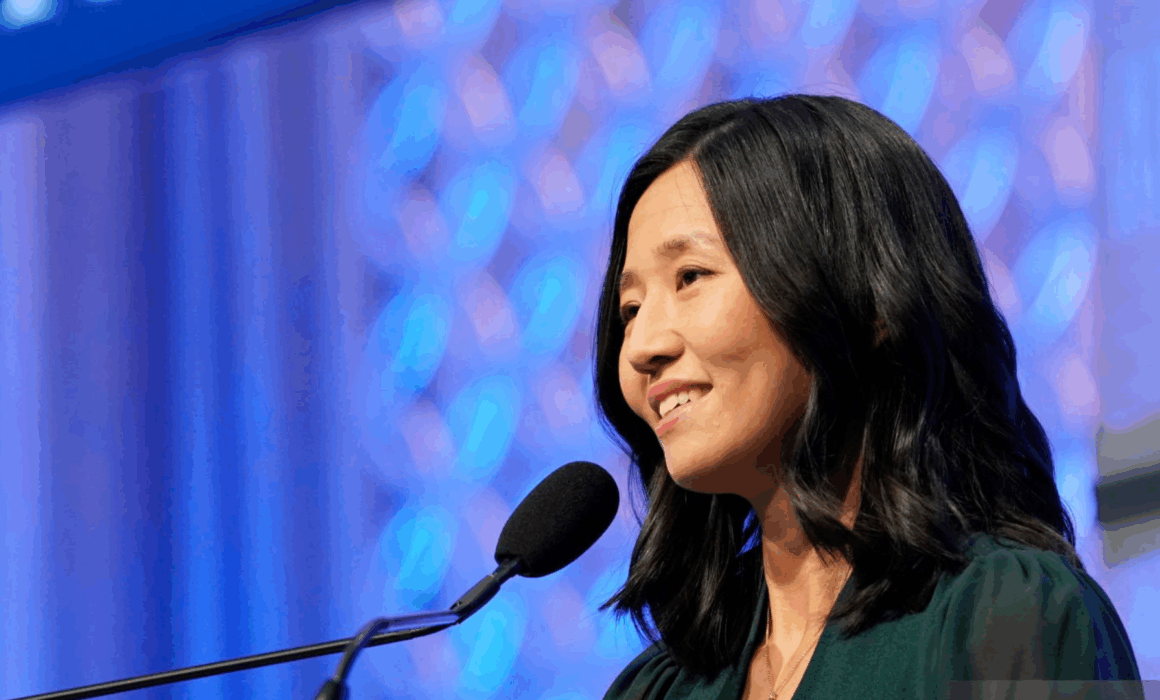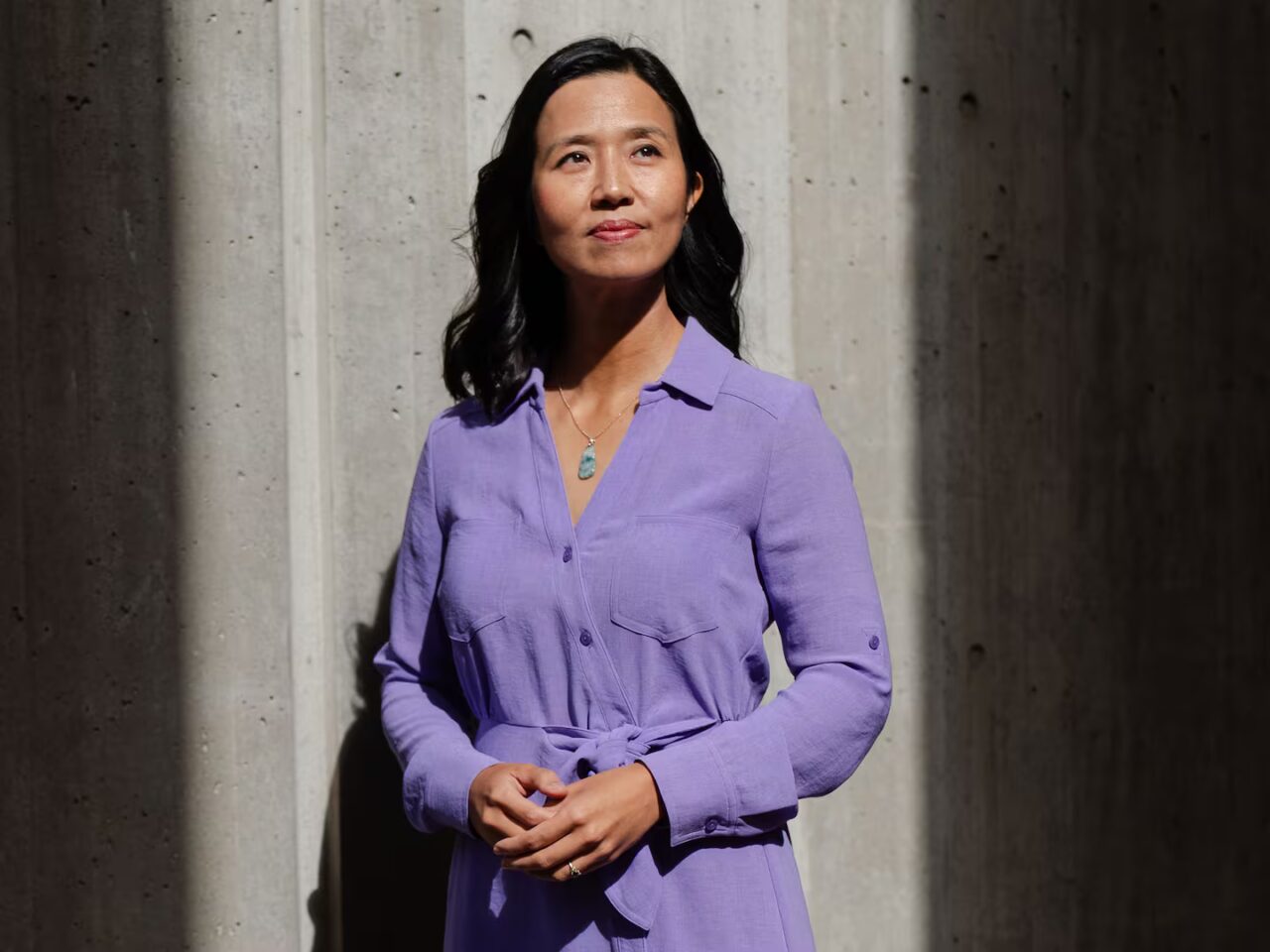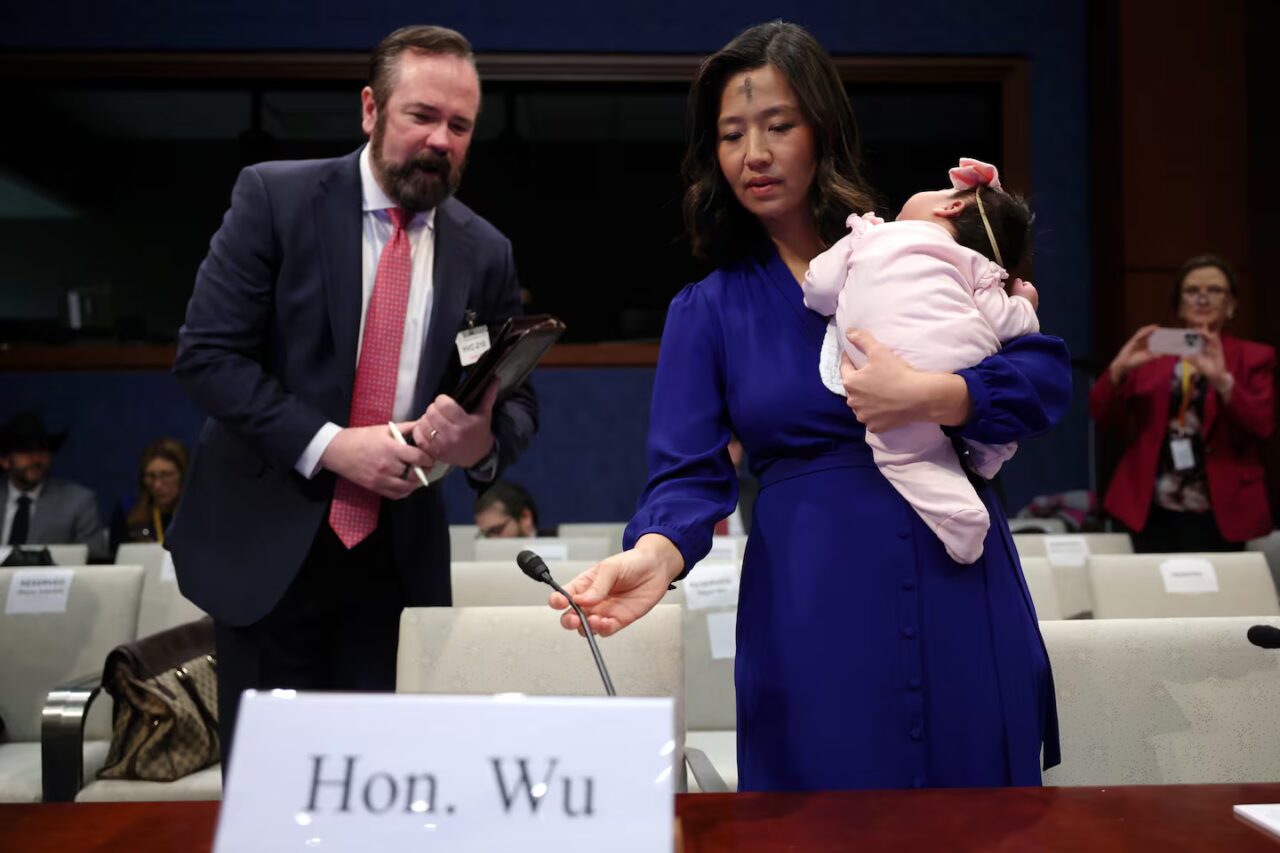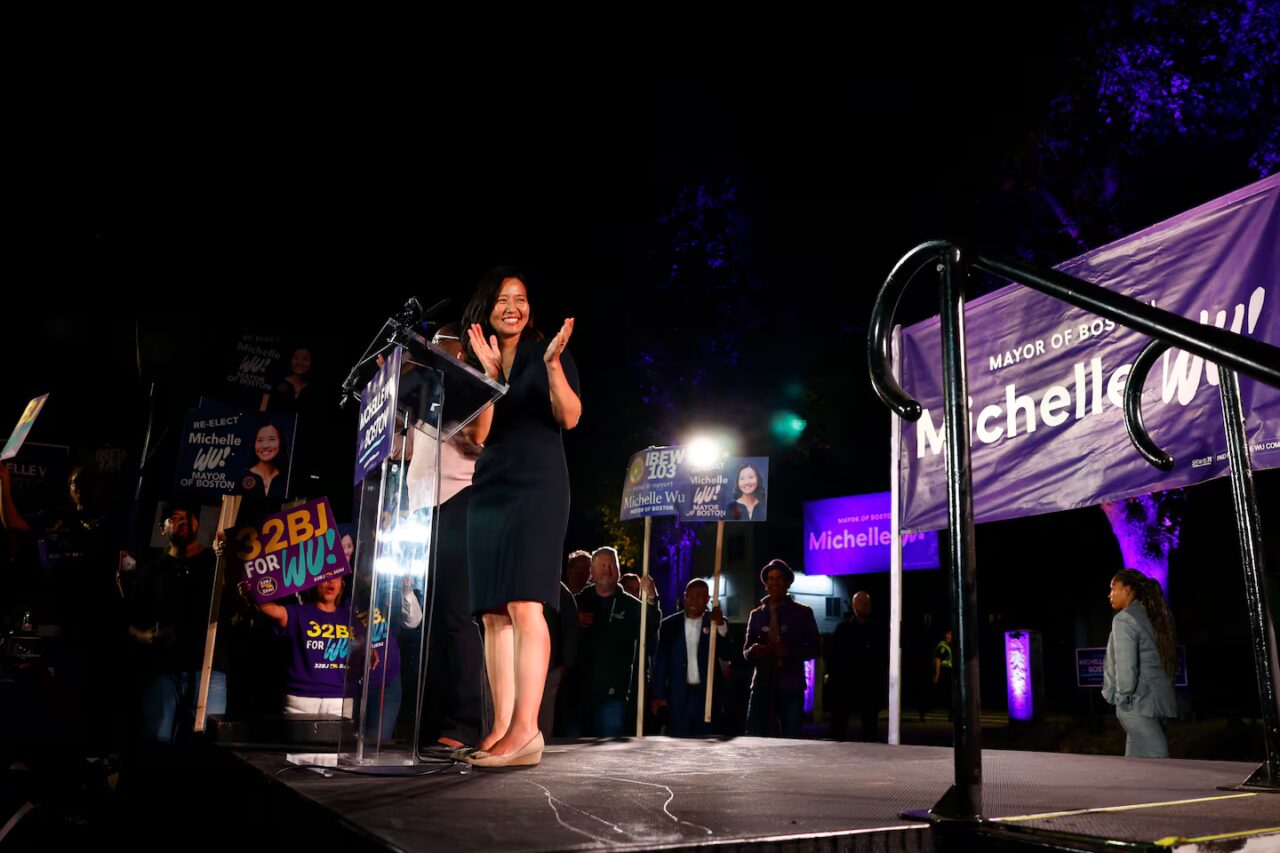
‘My God, is she on top of her game.’
Michelle Wu crushed foes in D.C. and at home. What’s next for the mayor?
Wu’s skills as a politician have never been more apparent.

On a recent Monday evening, in an elegant 25th-floor meeting room high above the city, a collection of Boston’s most powerful women gathered for canapés and a cause.
On the center table, beside the chafing dishes, a QR code sought donations to Mayor Michelle Wu’s reelection campaign. “Women for Wu” buttons, in the campaign’s signature purple, decorated the high-top tables where attendees mingled. “Re-elect Michelle!” beamed on three enormous projector screens.
Of course, they already had.
It had been three weeks since Wu clinched a decisive victory in the city’s preliminary election for mayor, winning 72 percent of the vote and chasing opponent Josh Kraft from the race. Since then, previously scheduled fund-raisers such as this have taken on the tone of pep rallies.
If her first election as mayor gave her a strong mandate, now Wu has a margin of support that would satisfy a third-world dictator, as one former city pol put it. Four years ago, city cops loathed her; this year, the largest Boston police union endorsed her. Her allies stock the City Council and Democratic ward committee leadership ranks, and nationally known Democrats, including the likely next mayor of New York City, point to her as a model.
“My God, is she on top of her game,” says Carol Lasky, co-chair of the Ward 4 Democratic Committee. “Has she grown? Has she found an amplified version of her voice?”
It “has always been very strong,” Lasky adds, “but not like this.”
In that room on the 25th floor of the Prudential Tower, the mayor is on top of the city. Wu, 40, is slim and soft-spoken, with an unyielding poise and movements that feel deliberate. When she hands off her infant daughter, Mira, to take the microphone, everyone offers a willing pair of arms. When she speaks, every joke lands.
If this newest version of Michelle Wu has an origin story, it is this.
On January 13, the mayor gave birth to her third child, Mira. On January 27, she received a request — not quite an invitation, not quite a subpoena — to appear before the Republican-led US House Oversight Committee, to answer for Boston’s so-called sanctuary city policies.
In early March, seven weeks postpartum, Wu appeared in a royal blue dress beside three male mayors in droll dark suits. Political strategists could hardly have dreamt up a more salient image. She had the Ash Wednesday cross on her forehead and a baby in her arms, a pink cloth draped over her shoulder to nurse in the final few minutes before the cameras and the hot lights rumbled on.
The standard advice on what to do when you appear before Congress is to shut up and duck. The hearings are made-for-TV moments, and as the witness you’re unlikely to enjoy your starring role. Think of the university presidents whose careers ended after viral flubs before our nation’s leaders.
To prepare for the onslaught, Wu hired a D.C. law firm at the rate of $950 per hour, holding a dozen prep sessions. The bill would ultimately total more than $750,000. She consulted Kristen Orthman, a political strategist who had worked for the Biden White House and Elizabeth Warren’s presidential campaign. Wu called each member of Massachusetts’ congressional delegation, some of whom serve on the oversight panel.

When the interrogation began, Wu seemed not to be ducking. As Republicans on the committee tossed out bait, she batted it back. She rejected their premises and corrected their claims. And she challenged the committee, too — the crime rate in Boston is lower “than your district,” she told a Republican congressman in one pointed exchange.
It was immediately one of those moments. Here was a woman leader who had managed to make child rearing a political advantage. Here was a potent foil to President Trump: a young woman and mother, calm and well spoken, a Harvard graduate two times over, the daughter of Taiwanese immigrants who was a citizen thanks to the birthright citizenship clause Trump has attacked. Here was a progressive leader whose housing-dense, diverse, innovative city could not be caricatured as a crime-ridden hellhole in need of federal takeover — a city where, as Wu repeated over and over, violent crime is near the lowest in the nation.
While the hearing was still going on, Wu’s team blasted out fund-raising emails and social media posts featuring her best moments. When the Globe published an early version of the story, three Wu allies texted the reporter almost simultaneously to complain that the headline did not go far enough to capture her triumph.
“‘Emerged largely unscathed’?” they gaped. One added a thumbs down emoji.
In the months since, Wu’s performance at the congressional hearing has become shorthand for a kind of political savviness no one can dispute. The mayor recounts it at fund-raisers. Voters mention it unprompted. Nearly every person interviewed for this story brought it up.
If Wu’s reelection year has been a championship run, the hearing was the first scene in her highlight reel.
Cue music. “Shame on him for lying about my city,” she said of Trump’s border czar, in the first few moments of the hearing.

Cut to: Mayoral forum in May. Candidates are asked what city ward they live in, and Wu’s chief opponent, Kraft, sheepishly confesses he does not know. Wu leans forward and silently holds up three fingers.
Open on: the night of the preliminary election, Adams Park, Roslindale. Another blue dress, another adoring crowd. “Today,” she told supporters, “you sent a message to Josh Kraft, to Donald Trump, and to all their enablers: Boston is not for sale.”
Just watch the montage: Wu is better at this than she used to be. She also seems to take pleasure in driving up the score.
“Forty-nine points,” Wu joked to the cheering women at the fund-raiser, referring to her staggering margin of victory. “You know, I did want that last percentage point, but it’s fine, close enough.”
⸻
On the last truly summer Saturday afternoon of the year, in Boston’s most suburban southwest corner, parents gathered for the time-honored tradition of children’s soccer in Millennium Park.
One of them was Wu, in an Eastie T-shirt and an Institute of Contemporary Art hat, toting a folding chair and teething-friendly snacks for the baby. As she settled in to watch her eldest, Blaise, many people recognized her, but not everyone.
“Wait, is that you, Michelle Wu?” asked one little boy.
She laughed, nodded. “Who are you?”
Another boy, about 10, had a more serious agenda. “I just wanted to ask about your campaigning strategies. Are you planning to become mayor again?”
“Yes,” she said, explaining that the first round of voting is over and the final round — now just a formality — is on November 4.
“What are your thoughts about the opposing party? Josh Kraft?”
“So, Josh Kraft dropped out, actually,” Wu explained. “When the votes were counted up, we got 72 percent of the votes and he got 23.”
“Wow,” the boy said.
⸻
You must be feeling on top of the city right now, I offered.
“It’s definitely rewarding, and a bit of a relief,” Wu said. “But I heard a lot on the campaign trail about things we need to do better.”
She added: “I have the gift and blessing of getting to steward the most incredible place on the planet. But I don’t take it as the vast majority of the city is 100 percent happy with everything that’s going on.”
⸻
Wu’s story stretches back to her immigrant family’s experience in Chicago. When she was 5 or 6, her Taiwanese grandfather was falsely accused of shoplifting a pair of gloves at Burlington Coat Factory because he didn’t speak English. She had to translate as security guards detained him. Later, he told her, “Don’t focus on the gloves. Focus on the coat.” That lesson of resilience defined her.
⸻
Nothing Wu does is accidental. She takes her own notes in meetings, color codes her calendar, and knows the city’s politics inside out. When progressive cyclists once protested her pace on expanding bike lanes, she tweeted, “Should I bike to work tomorrow?” and did — cameras rolling — turning criticism into symbolism.
“Michelle understands politics better than probably anyone I ever served with,” says former City Councilor Matt O’Malley.
“Michelle has always been this incredibly smart, brilliant mind,” he added. “Now she’s on a national stage. She has gravitas — and she’s comfortable showing it.”
⸻
Not every battle has been a victory. The city’s election department was put into receivership after mismanaging ballot supplies. Housing construction is at its lowest in a decade. Developers accuse Wu of halting growth by imposing strict green and affordability rules.
“She’s an iron fist in a velvet glove,” said Eastern Bank chair Bob Rivers.
The Massachusetts Legislature has also resisted her biggest policies — rent control, free public transit, and shifting the tax burden from residents to businesses.
Still, Wu pushes on. “I would have hoped we made more progress expanding free T,” she said. “But I’m proud of what we’ve built.”
⸻
Critics say Wu could accomplish more by forging stronger alliances with Beacon Hill and the business community.
“She gets focused on what she wants,” said Jim Rooney of the Greater Boston Chamber. “She listens, but she makes her own call — even if it’s not what others want.”
⸻
At Millennium Park, Wu’s son’s soccer team won 6–2 — almost exactly the same ratio as her margin over Kraft.
There is no mercy rule in Boston politics. Even with polls showing her 50 points ahead, she kept fighting. “Kraft macaroni baloney,” she quipped, dismissing his attacks.
Her sharp rhetoric and confident campaigning left no doubt: this was her city.
⸻
Wu’s growing national profile has sparked speculation about higher office. She denies it.
“I have no national ambitions,” she said. “I have ambitions to make Boston Public Schools the best in the country. I have a lot I want to get done here.”